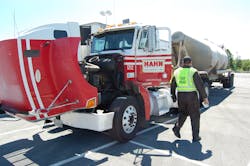How smaller fleets can better deal with CSA
The Federal Motor Carrier Safety Admin.’s (FMCSA) Compliance, Safety and Accountability (CSA) safety-scoring system is leading owners and managers of truck fleets of all sizes to rethink every aspect of their operations that has bearing on highway and driver safety.
But the larger a fleet is, the more resources it can readily draw on to take on the challenges of CSA. On the other hand, according to Nick Goodell, general manager— trucking & transportation, for Compli, a web-based provider of safety, HR & compliance- management systems, for small- to medium-sized fleets dealing with CSA can “often be overwhelming, especially with CSA changes and updates seemingly occurring on a daily basis.”
Regarding the complexity, Goodell points to the latest CSA modifications that include significant changes to the BASIC categories; weighting changes for individual violations based on updated crash predictors, and terminology that more openly reflects the available data and moves towards a better coordination with roadside enforcement.
“Meanwhile, CSA now takes into account five violations for the cell phone restrictions that have been issued by FMCSA, which can make companies themselves accountable for allowing or requiring drivers to use mobile devices,” he stated. “Rulemaking for sleep apnea screening and new hours of service regulations have also been added to the system.”
As Goodell sees it, “size-challenged” fleets lack resources like the fully staffed and automated IT and HR departments prevalent with most of their bigger colleagues. The upshot is “many are simply being reactive and only responding when a violation or intervention occurs, quietly suffering through higher operating costs,” he explained. “Others are networking with peers for advice, but only at the upper management level with little or no information ever finding its way to drivers and other employees.”
Along with seeking CSA answers from such resources as state trucking association, professional consultants, attorneys and accountants, Goodell told FleetOwner that “more and more small- to mid-size fleets are also turning to software providers that can serve as another important source for standardizing and simplifying CSA processes.
“A solid safety, HR and compliance management software system can help carriers be proactive and knowledgably predict potential problem areas before they become an area of CSA concern,” he continued. “Systems also provide a good communication channel for drivers and other employees for issuing updated policies, training, reporting forms, and more to keep CSA scores low.”
In Goodell’s view, software systems today also allow fleets to be more proactive and better manage CSA inspection reports. “If a violation does occur, the required training can be automatically generated to the violator as well as the supervisor and other interested parties,” he advised. “Once the training is completed, the system allows employees to automatically sign off on it and the company has an audit trail.”
He also pointed out that “despite the myth that switching from a paper system to an electronic one can be an arduous task, most contemporary electronic CSA management tools can be quickly and easily installed—with a typical installation being completed in a matter of days. Your better providers will already have all of the backend work pre-populated and set up for a smooth integration.”
According to Goodell, CSA-specific implementation “involves little more than allowing a provider access to a fleet’s data through the FMCSA portal.” He noted that by a couple of days later, CSA management and other regulatory compliance requirements are accessible in one location.
Using software instead of a paper-based managements system also provides for scalability, Goodell advised. “Software can be implemented without a lot of hardware via an internet connection. And having a per-user fee [for the software], makes it scalable for the number of drivers a fleet has.
“Managing the system on paper doesn’t allow for scaling up as drivers are added,” he added, “and some segments, such as fleets serving the oil and gas industry, are growing very quickly now.”
What’s more, said Goodell, “FMCSA wants to see that CSA policies are being made and distributed. Software can both distribute policies and document that employees received them.” He added that “HR in general is not a core competency for fleets and now there is more data and paperwork to be managed and in many cases, more people to be managed as well. Through software, CSA activities can be ‘outsourced’ at reasonable cost.
“Perhaps best of all,” Goodell continued, “the cost of converting to an electronic system is not as daunting as most would suspect, with most fleets realizing a return on investment in a matter of months.
“The payback comes in terms of the fleet’s managers being able to engage in more productive activities than chasing paperwork,” he added.
